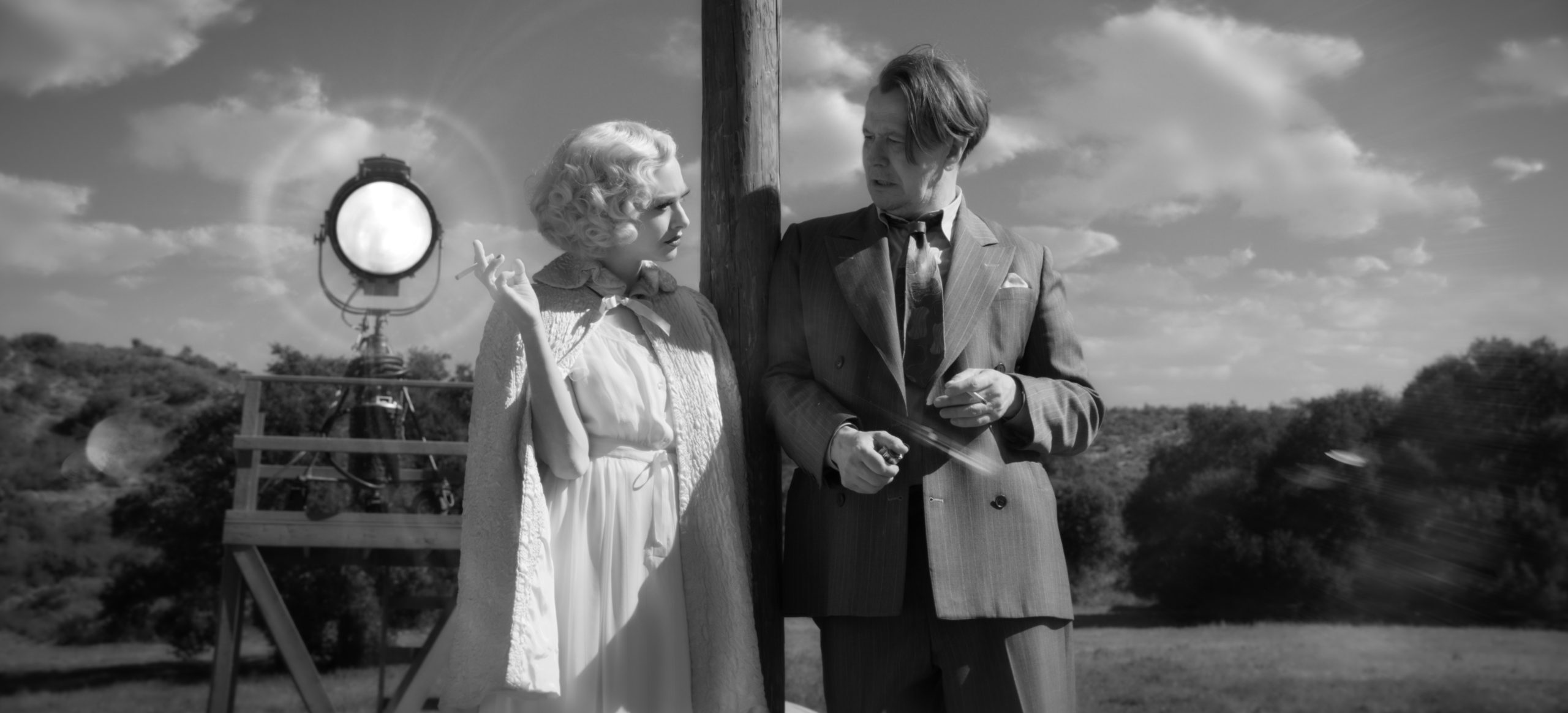At some point in your life you’re probably going to ask yourself, “What was the greatest movie ever made?” The mere fact that you’re reading these words means you’ve already asked yourself that question at least once. It’s the kind of question where you can ask 15 different people and get 15 different answers, with none of them being wrong – besides the guy who says “Gladiator,” of course. That guy is wrong. The generation above me told us the answer to this question was “Citizen Kane.” I won’t refute that answer, but I think it’s promoted by people who need it to be right, including the makers of today’s biopic: Mank.
Herman J. Mankiewicz (Gary Oldman) aka “Mank” -the credited screenwriter of Citizen Kane– was a high-paid script mercenary in Hollywood as the talkie era was introduced. How “high” is high? Try $2,500/week. Most of you could live on that now, comfortably. Imagine what it was worth during The Depression … well, THAT depression. In 1930s Hollywood, writing was a communal profession; think of how most late-night talk shows are written (people sitting around a table) and you’ve got some idea. Except instead of a table, it’s just an empty room; instead of people, it’s just white men; and instead of color, it’s all in b&W, like Mank.
In pre-WWII Hollywood, none of the writers ever got credit for their work. This is by design. Somehow movie insiders still knew the top banana from the peel, which is how Mank got introduced to newspaper magnate and movie producer William Randolph Hearst (Charles Dance). But I’m getting ahead of myself. Wait. No I’m not. First Mank had to agree to write Citizen Kane in 1940. Then he had to break his leg to show how he’s able to concentrate on knocking out the Kane first draft in 60 days. But the broken leg happens before Orson Welles tags him. And then, before that, he meets Hearst in the 1930s.
If you’re not getting what’s going on here, Mank fully intended to mirror the circular narrative of Citizen Kane itself, in stylish b&w no less and a story told in several different timelines at once. We keep the two main timelines apart by showing how tied to bedrest Mank is. You see, in attempting to tell the story of Citizen Kane’s writer, director David Fincher has cleverly emulated the feel of Citizen Kane itself. Is this iterative? Eighty years from now, are we going to tell the story of Mank’s writer (Jack Fincher, David’s father) in the style of Mank?
And here also we get to my criticism – I wasn’t a huge fan of Citizen Kane, and remaking it in another form resuscitates the same issues I had with the “greatest movie ever made.” I can see you’ve made a stylish, erudite, and ahead-of-its-time film, but the dialogue assumes I lived in Hollywood during the Kane era, the circular narrative makes the film harder to follow, and –most importantly – I don’t like the main character in either film. I dunno how many films you need to make before you learn this lesson, but if you don’t either love the hero or love-to-hate the hero, the film suffers. And it suffers greatly here. Oldman plays Mank as a bad drunk, a bad family man, a bad gambler, a bad friend, and societal/bourgeoisie foil all while acknowledging that society and the royalty he sneers at are paying his bills.
And what was the falling out that inspired Mank to turn on William Randolph Hearst, the heavily criticized “subject” of Citizen Kane? Well, it had to do with the 1934 California gubernatorial election between Frank Merriam and Upton Sinclair (yes, that Upton Sinclair). Apparently, Hearst threw his weight into unleveling the playing field with some untruthful radio ads aimed to tar Sinclair as a communist.
Is that it? Seriously, is that it?
Look, I’m all for cutting off the purse-strings that sway elections, but SERIOUSLY is that all you have? Here’s the thing – the bar on libel and election undermining has been raised considerably in our time. We just had a lame duck president attempt a coup to hold onto power and – in the wake- the minority white supremacist members of his party in the Senate made sure he wouldn’t be held accountable … that’s about ten levels of corruption deeper than “lied in some radio ads.” Was there an entire RW network devoted to spinning or ignoring the worst of the candidate in 1934? Were there several, like we have today? Hell, Hearst was a publisher, no? Did his papers report how Hoover’s economy was the “best in US history” until that goshdarn Depression happened? Did it summon fabrications about a portfolio from Upton Sinclair’s son that somehow surfaced in New Jersey and inexplicably ties him to the Russian Revolution? Did it report “fine people on both sides” of Auschwitz?
spinning or ignoring the worst of the candidate in 1934? Were there several, like we have today? Hell, Hearst was a publisher, no? Did his papers report how Hoover’s economy was the “best in US history” until that goshdarn Depression happened? Did it summon fabrications about a portfolio from Upton Sinclair’s son that somehow surfaced in New Jersey and inexplicably ties him to the Russian Revolution? Did it report “fine people on both sides” of Auschwitz?
I’m sorry, but while I’m overjoyed to join in the GOP/fatcat bashing bandwagon, it’s hard for me to feel the Bern from the perspective of a drunk who made six figures in 1930s money. KnowwhatI’msayin?
Mank is precisely the kind of film that wins awards; I won’t be surprised if it does. It has style and charm and comes from a host of talented veterans. But it hasn’t been until this moment that I understood the true cynicism in the words “Hollywood loves to celebrate itself.”
It’s a movie about an American blue blood
Who made his fortune from the raking of mud
I like Citizen Kane fine
Yet I’m not out-of-line
In claiming it’s not terribly rosy, bud
Rated R, 131 Minutes
Director: David Fincher
Writer: Jack Fincher (Huh. He has the same last name as the director. What a coincidence)
Genre: Kane-lore
Type of being most likely to enjoy this film: People who believe Citizen Kane is the greatest film of all time
Type of being least likely to enjoy this film: Others



